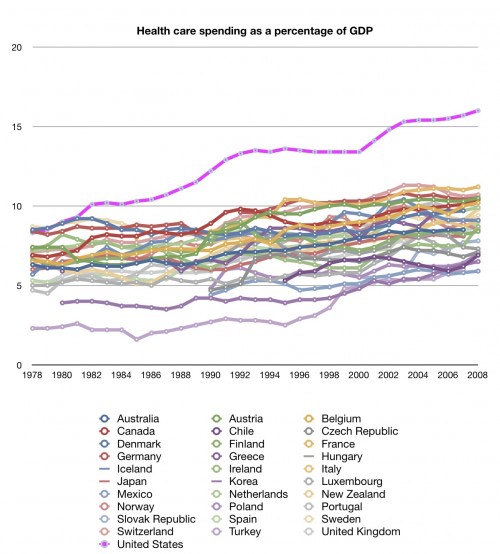October 24th, 2010 by BobDoherty in Better Health Network, Health Policy, News, Opinion, Research
No Comments »

Last month the U.S. Census Bureau released its annual survey on health insurance coverage. The results were startling, yet few politicians seemed to take notice:
— The number of people with health insurance declined for the first time ever in almost two decades. In fact, as reported by CNN this is the first time since the Census Bureau started collecting data on health insurance coverage in 1987 that fewer people reported that they had health insurance: “There were 253.6 million people with health insurance in 2009, the latest data available, down from 255.1 million a year earlier.” The percentage of the population without coverage increased from 15.4 percent to 16.7 percent.
— Almost 51 million U.S. residents had no health insurance coverage at all, a record high, and an increase of almost five million uninsured from 2008.
— Fewer Americans received health insurance coverage through their jobs, continuing a decade-long trend. The number covered by employment-based health insurance declined from 176.3 million to 169.7 million, reports the Census Bureau. Based on the Census numbers, the Economic Policy Institute observes that “the share of non-elderly Americans with employer-sponsored health insurance declined for the ninth year in a row, down from 61.9% in 2008 to 58.9% in 2009, a total decline of 9.4 percentage points since 2000.” Read more »
*This blog post was originally published at The ACP Advocate Blog by Bob Doherty*
October 21st, 2010 by Stanley Feld, M.D. in Better Health Network, Health Policy, News, Opinion, Research
No Comments »

It is important to listen to what physicians are saying. An article appeared in SERMO, a physicians’ social network, which expressed a physician’s frustration. It is appropriate to publish some of that physician’s thoughts:
“I first heard this statement over twenty years ago, when I was an intern in general surgery, struggling to find my professional self.”
“My chief resident said; “The patient owns the disease,” “You’re not trying to make them suffer, you’re trying to help. They’re sick, you’re not.”
“The human body is unpredictable. Disease complications happen.”
The author thought his chief resident was heartless and callous. In a way, he was but he was getting at the heart of the matter. What is the patient’s responsibility in the evolution of disease? Read more »
*This blog post was originally published at Repairing the Healthcare System*
October 20th, 2010 by Davis Liu, M.D. in Better Health Network, Health Policy, News, Opinion
No Comments »

The first-year medical students I precept were too young to see Tom Cruise’s alter ego Lieutenant Pete “Maverick” Mitchell grace the big screen in the 1986 blockbuster film “Top Gun.” Yet, the story has a relevant analogy to medicine.
According to the film, during the Vietnam war American pilots were relying too much on technology to bring enemy fighters down. They weren’t as skilled in taking out the opposition. They fired their technologically advanced missiles to try and get the job done. They didn’t think. It didn’t work. They forgot the art of dogfighting.
The military discovered that technology alone wasn’t going to get the job done. The best fighter pilots needed the skills, insight, and wisdom on when to use technology and when not to. As a result, the Navy Fighter Weapons School, known simply as Top Gun, was created to retrain the military pilots on this vital lost skill. The goal of the program was specifically to make the best of the best even better.
Like the military, the country is discovering that the healthcare system enabled with dazzling technology isn’t getting the job done either. Read more »
*This blog post was originally published at Saving Money and Surviving the Healthcare Crisis*
October 11th, 2010 by Shadowfax in Better Health Network, Health Policy, Opinion, Research
No Comments »

Aaron Carroll over at The Incidental Economist has been running an excellent series on healthcare spending in the U.S. and how much more we spend than the rest of the world on a per capita basis, as a percentage of GDP, and by category. It’s an excellent series and I wholly recommend it. Summary graph:

Hint: the U.S. is the lavender-ish line on top. As he says, is there anything about this graph that isn’t concerning? Read more »
*This blog post was originally published at Movin' Meat*
September 30th, 2010 by RyanDuBosar in Better Health Network, Health Policy, News, Opinion
No Comments »

Government healthcare reform efforts are picking up the pace to roll out new reimbursement and practice models for primary care.
Medicare is giving out $10 billion for pilot projects encouraging new models of primary care, including the patient-centered medical home. New Jersey just passed legislation to explore the patient-centered medical home. Now, Massachusetts, the early adopter of mandatory health insurance, is now ambitiously planning how to take on the fee-for-service reimbursement system and moving toward accountable care organizations. Under discussion are the scope of power for state regulators, what rules will apply to accountable care organizations, and how to get rid of the existing fee-for-service system.
Blogger and pediatrician Jay Parkinson, MD, MPH, comments about the “bureaucrats in Washington” that, “they’ve decided for doctors that we’ll get paid for strictly office visits and procedures when, in fact, being a good doctor is much, much more about good communication and solid relationships than the maximum volume of patients you can see in a given day.”
Now, it’s those same bureaucrats who are changing the system, trying to find a model that will accomplish just those goals. (CMS Web site, NJ Today, Boston Globe, KevinMD)

*This blog post was originally published at ACP Internist*
















